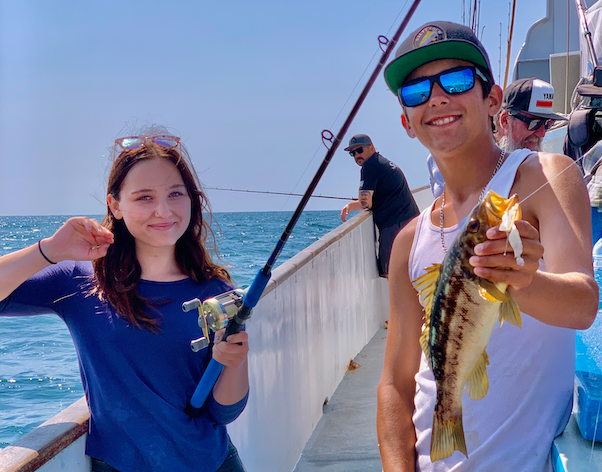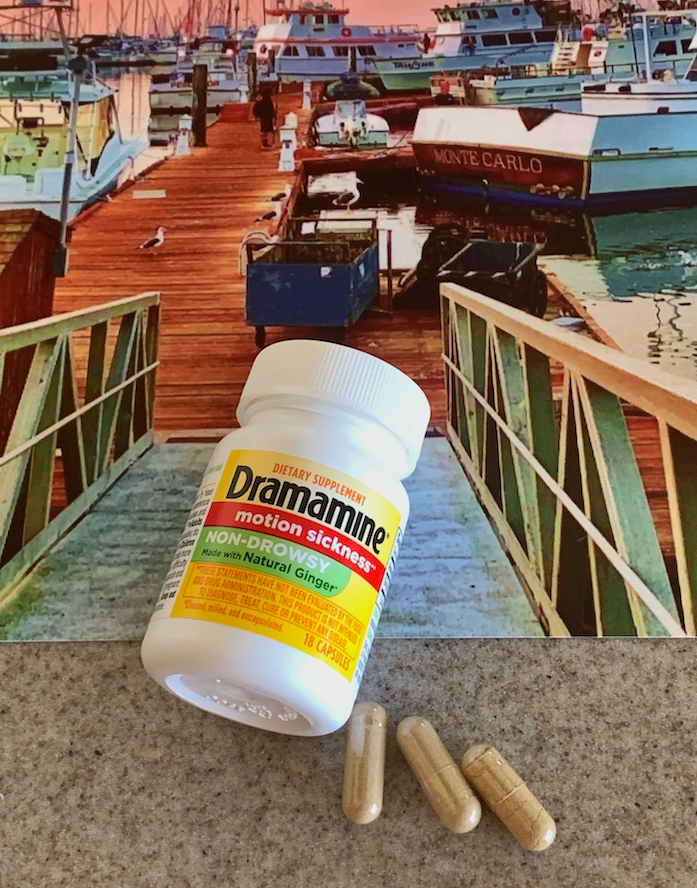
BY JON DICKENS
The day started out with high hopes and expectations. The fish have been biting and you and your friends are looking forward to a great day on water. Until one of them says, “Oh, I don’t feel so good. I think I’m getting seasick.” If you’ve ever experienced that queasy, nauseous feeling, you know it’s one of the worst feelings in the world.
The two biggest reasons people get seasick
While nothing is 100 percent foolproof at preventing seasickness, there are a number of things you can do to put the odds in your favor. But before getting into those steps, be aware of the two primary reasons most people succumb to seasickness.
- Not taking precautions in advance. Some don’t think they need to take seasick medications or watch what they eat or drink in advance. Some are “manly men” – too macho or embarrassed to take precautions in front of their friends.
- Being afraid that they might get seasick. That mental aspect is hard to overcome for some people. Once they get it in their head that they might get sick, they often times do just that.
What causes seasickness?
Without getting overly technical, seasickness occurs when there’s conflict between the inner ear, which houses our balance mechanism, and the eyes and ears along with other sensing systems in the body. When motion is felt by one sense and not the other, that causes motion sickness. In other words, seasickness is a result of the brain getting mixed signals and being unable to process them coherently. If you’ve been on the water long enough, chances are you’ve experienced some form of seasickness.
Here are four steps you can take to prevent this miserable malady:
- Check the weather
If you or someone going with you is concerned about seasickness, the first step is to check out the marine weather forecast on sites like windy.com, knotabyte.com, buoyweather.com and weather.gov. I’ve found these sites to be pretty accurate. On some, you can pinpoint the actual area you’re likely to be fishing to see what’s predicted on the day of your trip. A caveat here however is you’re dealing with Mother Nature. If she got up on the wrong side of the bed on departure day, that “smooth sailing” weather can quickly be turned upside down. By the same token, I’ve been out on days when the forecast was pretty dicey, but it turned out to be as flat as a lake.
Some of the things you should look at on the marine weather sites are wind, wind direction, swell and wave height, and time between waves. Wind is easy to understand. If it’s predicted to blow at 20 knots or more, stay home. Wave height is another issue. As an example, a wave height of four feet can be comfortable if the time between waves is 15 seconds, which means a slow gentle swell. But if the period between waves is five seconds, you’re in for a bumpy, uncomfortable day, one that you might want to avoid.
- Common sense precautions
Even if the marine forecast looks like it’s going to be Lake Pacifica out there, play it smart the day and evening before your trip. Stay away from greasy or spicy foods, and – okay this one’s not going to be popular with certain crowds – alcohol. Those intakes may sound like fun the night before, but can ruin your day on the water. Be smart. Those dynamite habenero tacos with beer chasers won’t taste as good coming up as they were going down.
If you like to party, do it the night after your trip, not the night before. Get plenty of sleep. Easier said than done for some, myself included. Even after decades of fishing, the anticipation of the alarm going off early keeps me checking the time much of the night, and my brain is on fast forward, as I mentally go through my tackle and what I’m going to use for each likely scenario the next day. Nevertheless, try for a good night’s sleep.
On the morning of your trip, put something in your stomach before you get on the boat. Toast, a bagel, a little cereal or a banana, are safe bets. Ginger tea is also a good idea. Just don’t put too much liquid in your stomach to prevent that gurgly, sloshing around feeling.
- Seasick medications
To play it safe, take one of the over-the-counter motion sickness

medications like Bonine or Dramamine, or ask your doctor for a prescription for the Scopolamine patch that is placed behind the ear and slowly dispenses the medication for up to three days. Many of these medications can cause drowsiness, although there are some formulas that minimize this effect.
The best tip I’ve learned if you’re taking the OTC meds, is to take a half-dose the night before your trip to get the medication into your system, and follow up with the regular dose about an hour before departure. It makes a big difference. Several years ago I gave my daughter this advice before a boat trip off of Australia with her friends. The weather deteriorated rapidly the day of the trip with near gale force winds. She and those of her friends who took the medication the night before managed to weather the storm without getting seasick, while those who only took it the morning of the trip, didn’t fare so well to put it mildly. Give it a try.
- At-sea preventative measures

Once you’re feeling queasy, there are a few things you can do to try and minimize the mal de mer. The one standout treatment, and no one seems to know exactly why it works, is ginger. Ginger gum or chews are good to have on hand. Take them in advance or at the first signs of not feeling well. The aforementioned ginger tea is also soothing, as is ginger ale. I usually keep some ginger gum or chews with me and hand it out to people with that ghostly pale or I-don’t-feel-good look on their faces. It’s helped turn things around for many, especially kids.
Wrist bands, both acupressure and magnetic are also known to work for some. They apply pressure or magnets to the pressure point on the underside of your arm located about two fingers below the crease of your wrist. It is said that this point ties to a nerve that triggers nausea. It’s not a bad idea to put these on each wrist before getting on the boat.
There are some additional actions you can take to avoid getting sick once on the boat. First and foremost, if you feel a little uneasy, stay out on deck in the fresh air and away from odors coming from the galley. Burgers on the grill smell great if you’re feeling well, but not so much if you aren’t. Going below deck or in the cabin can make you feel worse. Stay topside and in the middle of the boat where it’s more balanced. The stern and especially the bow are where you’ll feel the motion the most, so stay amidships. Try to stare at the horizon to help realign your sense of balance and do not look at your cell phone or try to read. That will only accentuate your symptoms. Deep breathing with slow exhales can help relieve the stress of the moment too, and get you back on track.
If you’re on an overnight boat with bunks, try to get a bunk closer to the stern for a smoother ride. Those up towards the bow of the boat can be a bit bouncy and more uncomfortable if the seas are up. And if you can get a bunk near an on-deck entrance where there’s fresh air coming in, that will also help.
When I was about 12-years-old I got seasick on an overnight trip with my Dad. We had bunks near the diesel exhaust system that we later realized was leaking fumes into that area of the bunkroom. We both started feeling sick and went up on deck, only to be met by the aroma of bacon frying on the flattop. We both ran for the rail and did the old heave-ho.
Generally, if you do vomit, you’ll feel much better. Don’t be embarrassed about being sick. It happens. You aren’t the first and you won’t be the last to deal with it. Just remember to do it over the side and with the wind behind you to avoid blowback, and not in the head or anywhere on deck. No one wants to clean up after you. Remember too, that vomiting can cause dehydration so drink slow sips of water, ginger ale, Seven-Up, or clear liquids, and when you’re able to – small bites of dry food like saltine crackers, toast or non-greasy food. Save the boat burger for another trip.
If there are sick people already chumming over the side, try to stay away from them, as the sights, sounds and smells can trigger a similar reaction in you. Once sick, you may have moments where you feel like you just want to curl up in a ball and die, but remember that seasickness is short lived. You’ll get past it.
When all else fails, one of the very best seasick remedies is of course, to catch some fish. It’s like hitting the reset button and gets you focused on fishing and fun again. Long story short, keep a positive mental attitude and try some of the suggestions above to avoid getting into the curl and hurl position in the first place, and seasickness will become a thing of the past.
Here’s wishing you tight lines and smooth seas.



